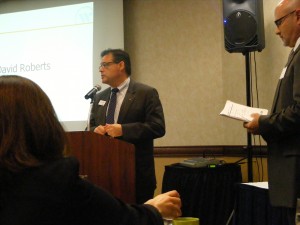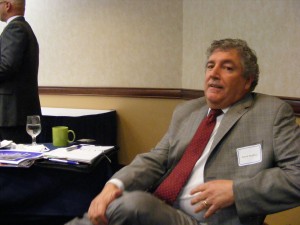
Oh, the things you find when you Dumpster dive.
Robert Shaffrey has a regular habit of scouring the most obscure places for personal information.
On one particular day, he found a box full of employment applications littered with life stories in a company”™s parking garage.
On a separate occasion, he found a wealth of information at an ATM.
“People empty their wallets into trash cans and you wouldn”™t believe the number of paystubs I find with a Social Security number,” said the vice president of sales for Dupli Envelopes and Graphics. “I always say, ”˜If I was careless with my Social Security number in 1975, it can come back to haunt me in 2010.”™”
Speaking at a recent Webster Bank Fraud Awareness forum in White Plains, Shaffrey, a document security specialist who has worked with legendary check forger turned fraud prevention purveyor Frank Abagnale Jr. for the last 30 years, said that there were an estimated 11.1 million cases of identify theft reported in the U.S. in 2010.

Losses were a staggering $55 billion in 2009.
Brendan Sachtjen, regional president of Webster Bank in Westchester and Fairfield, Conn., counties summed it up: ““It”™s easy; it”™s everywhere; and it”™s increasing.”
Fraud comes in many faces.
About $84 million was lost to cyber crime in 2009, noted Laurance Selnick, senior vice president at Webster.
A great way for businesses to minimize their losses is to monitor daily their accounts for signs of changes and unusual activity.
“Take a hard look at employee Internet policies,” Selnick said. “Use multifactor identification. Two people should always be involved in any transaction that moves money out the door.”
Shaffrey said old-fashioned paper theft is still a root cause of fraud.
He recalled an instance when his son decided to sublease a room in New York City while beginning his first job. Each month, “John” collected rent checks and thoughtfully forwarded them to the building”™s landlord.
One day, Shaffrey received a call from his distraught son, saying “Dad, I think John”™s dead.”
The landlord had demanded $10,000 in back rent be paid.
It was only natural something awful had happened to “John.”
“This guy ”˜John”™ worked at Merrill Lynch, except when they called Merrill Lynch, they said no one by that name works here,” Shaffrey said. “On average, it takes 467 days to discover you are a victim of identity fraud. ”˜John”™ had sold the identity of my son.”
What you can do to protect yourself:
- Stop receiving prescreened credit offers by calling (888)-5OPTOUT.
- Stop getting paper statements on credit cards.
- Do not post Facebook pictures that coincide with your personal identification information, like what high school you went to or your mother”™s maiden name.
- If for any reason a bill is late one month, call and verify with the credit card company.



















